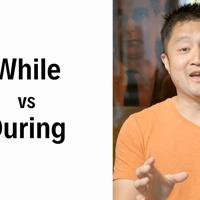While vs During - English In A Minute - YouTube
Zatímco vs během - angličtina za minutu - YouTube
While vs While – Englisch In einer Minute – YouTube
While vs During - English In A Minute - YouTube
While vs During - English In A Minute - YouTube
Enquanto vs Durante - Inglês Num Minuto - YouTube
While vs During - Английский за минуту - YouTube
While vs During - English In A Minute - YouTube
While vs During - English In A Minute - YouTube
While vs During - 英语一分钟 - YouTube
While vs During - 英语一分钟 - YouTube
Hi! This is Kee from BBC Learning English,
Hi! Hier ist Kee von BBC Learning English,
and today, I'm going to tell you the differences
und heute werde ich Ihnen die Unterschiede erklären
between 'while' and 'during'.
mezi „zatímco“ a „během“.
zwischen „während“ und „während“.
We can use 'while' and 'during' to say that a shorter event
Můžeme použít „při“ a „během“, abychom řekli, že jde o kratší událost
Wir können „während“ und „während“ verwenden, um auszudrücken, dass es sich um ein kürzeres Ereignis handelt
'동안'과 '동안'을 사용하여 짧은 이벤트를 말할 수 있습니다.
happened within a longer event.
došlo v rámci delší akce.
geschah innerhalb eines längeren Ereignisses.
더 긴 이벤트 내에서 발생했습니다.
They mean the same, but the grammar's different.
Znamenají totéž, ale gramatika je jiná.
Sie bedeuten dasselbe, aber die Grammatik ist anders.
After 'while', we have a clause.
Po „chvíli“ máme klauzuli.
Nach 'while' haben wir eine Klausel.
'동안' 뒤에는 절이 있습니다.
A clause is a group of words containing a subject
Věta je skupina slov obsahujících předmět
Ein Satz ist eine Gruppe von Wörtern, die ein Subjekt enthalten
절은 주어가 포함된 단어의 그룹입니다.
and a verb.
und ein Verb.
So we can say:
Wir können also sagen:
While I was having lunch, my phone rang.
Když jsem obědval, zazvonil mi telefon.
Während ich zu Mittag aß, klingelte mein Telefon.
Remember that the verb in the while clause
Pamatujte, že sloveso ve větě while
Denken Sie daran, dass das Verb in der While-Klausel
is usually in an ING form.
je obvykle ve formě ING.
ist normalerweise in einer ING-Form.
We can also use 'while' with just an ING form.
Wir können „while“ auch nur mit einem ING-Formular verwenden.
또한 ING 형식에 '동안'을 사용할 수도 있습니다.
So we can say:
Wir können also sagen:
While having lunch, my phone rang.
Beim Mittagessen klingelte mein Telefon.
So we remove the subject and the 'be' verb.
Also entfernen wir das Subjekt und das Verb „be“.
However, 'during' is different because it can
Avšak „běh“ je jiný, protože může
„Während“ ist jedoch anders, weil es möglich ist
only be used with a noun phrase.
nur mit einer Nominalphrase verwendet werden.
는 명사 구문과 함께만 사용해야 합니다.
So we can say:
Wir können also sagen:
During lunch, my phone rang.
Während des Mittagessens klingelte mein Telefon.
We cannot use a clause or just the ING form.
Wir können keine Klausel oder nur das ING-Formular verwenden.
So, same meaning, but different grammar!
Also, gleiche Bedeutung, aber andere Grammatik!

